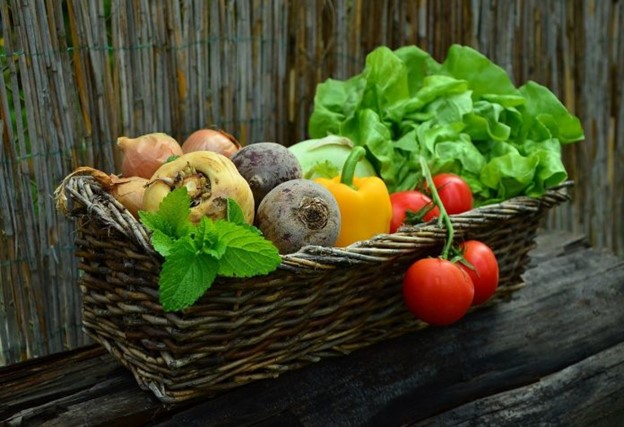Micronutrients – namely vitamins and minerals – provide energy, help the healthy development of the body, prevent disease and premature aging of the body. To maintain your health, you must be careful to choose foods that provide you with the necessary minerals and vitamins, to avoid the risk of nutritional deficiencies. Lack of micronutrients in the body can lead to chronic diseases.
- Calcium
This mineral is important for the development and maintenance of strong bones. Therefore, it is good for the bone system to get enough calcium through diet.
Calcium plays an essential role in the body:
- in the transmission of nervous messages;
- in the secretion of hormones and enzymes;
- in support of blood clotting;
- in maintaining healthy teeth;
- in regulating blood pressure;
- in muscle movement.
Calcium deficiency can give rise to a number of symptoms such as: muscle aches, tingling in the hands and feet, cramps, insomnia, fatigue.
To provide your body with the necessary calcium, you can eat foods that contain it, such as:
- nuts, sunflower seeds, sesame seeds, Brazil nuts, almonds;
- oatmeal, wholemeal pasta, green vegetables;
- citrus fruits, berries, beans, lentils, peas, dried fruits;
- nettle, red clover, raspberry leaves.
Of course, important sources of calcium are also dairy products, milk and cheese.
By combining Ca (Calcium) with vitamin D, this mineral is better absorbed into the body. In order to have enough calcium in the body, you can also consider calcium supplements.
- Vitamin D.
Vitamin D is important for maintaining calcium in the body, so that this mineral is well stored in the skeleton. Vitamin D reduces the excretion of calcium through the kidneys and stimulates bone cells to assimilate it.
Other benefits of vitamin D are:
- improves the function of the body’s immune system;
- helps regulate muscle contraction;
- supports the nervous system, helps revitalize the brain;
- decreases the risk of fractures;
- maintains normal blood levels, which will reduce the risk of getting sick.
Vitamin D deficiency can predispose to serious diseases, such as: osteoporosis (decreased bone density), autoimmune diseases, infectious diseases, hypertension, osteopenia, muscle weakness, periodontitis, senile dementia, muscle pain, Parkinson’s disease. Vitamin D deficiency has been shown to affect memory, concentration and mood.
People should be exposed to the sun daily to form an adequate amount of vitamin D in the body. In the summer, this is much easier, so it is said that during this season they do not need the intake of vitamin supplements. D, like in winter.
In general, fatty fish (salmon, herring, tuna) contain vitamin D, beef liver and fish oil. Vitamin D is also found in milk, oysters and egg yolk. People who do not eat meat and fish can choose other types of foods rich in vitamin D, such as:
- shiitake mushrooms, chanterelle mushrooms;
- cereals (oatmeal), sweet potatoes;
- Orange juice;
- dandelion leaves, nettle, alfalfa, parsley.
- Vitamin C
This water-soluble micronutrient is essential for the body because:
- strengthens the immune system;
- supports the proper functioning of the adrenal glands;
- reduces damage caused to blood vessels;
- helps with folic acid metabolism;
- reduces asthma symptoms;
- has antioxidant action, helps the body fight against the harmful attack of free radicals, which prevents disease;
- decreases the risk of chronic diseases, heart disease, cancer, macular degeneration, osteoarthritis;
- helps to restore tissues;
- maintain gum health;
- facilitates the absorption of iron in the body;
- helps detoxify the body, neutralizes heavy metals;
- prevents the development of cancer.
Researchers’ studies show that taking 500 mg of vitamin C daily can reduce the risk of heart disease. The researchers said that people who took 700 mg of vitamin C daily for 10 years had a 25% lower risk of heart disease. There are also studies that show that vitamin C lowers blood pressure and therefore helps in cases of high blood pressure.
There are many foods that contain vitamin C, namely:
- green leafy vegetables, cabbage, beets, blackcurrants, lemons, mangoes;
- red peppers, citrus fruits, broccoli, tomatoes, turnips, brown seaweed, onions, papaya, spinach, kale;
- strawberries, hawthorn leaves;
- pine needles, fennel seeds, parsley;
- raspberry leaves, yarrow;
- oats, nettle, mint, fenugreek, cayenne pepper, alfalfa.
- Iron
This mineral transports oxygen to the red blood cells and helps eliminate carbon dioxide. Iron produces hemoglobin and myoglobin, it is very important for the health of the immune system, for the efficient supply of energy in the body, prevents nervousness, digestive disorders and hair loss.
Iron can be taken from red meat, shellfish, liver, eggs, fish, poultry, but also from plant foods, such as:
- raisins, beans, lentils, soybeans, dandelions, alfalfa, oats, peas;
- apricots, vegetables, whole grains, avocados, beets, dates, almonds;
- prunes, rice, wheat bran, sesame seeds, soybeans;
- nettle, raspberry leaves, shepherd’s purse, yellow stevia, chamomile, dandelion.
Iron deficiency causes fatigue, dizziness, anemia, rapid heartbeat, pale and brittle nails. People with iron deficiency also complain of low tolerance to stress, nausea, constipation and non-specific gastrointestinal disorders. Also, insomnia is caused by the constant feeling of fatigue and lack of iron.
- Zinc
This mineral is responsible for the metabolism of enzymes, nucleic acids and proteins. It occurs intracellularly in muscles, skin, hair, bones. Therefore, its presence is important in the body, supports the increase of the body’s resistance and helps to regenerate tissues.
Zinc deficiency can cause irreversible nerve damage, thinning of the nails, hair loss, predisposition to diseases (such as diabetes, colds, flu, prostate problems).
Zinc can be taken from:
- legumes, whole grains, seeds;
- carrots, beets, blueberries, celery, tomatoes, mushrooms;
- red and brown algae, cocoa;
- vegetables with berries, pecans;
- pumpkin seeds, sunflower seeds;
- alfalfa, dandelion, parsley, sage, stevia, rosehip.
Zinc is also found in meat, milk, eggs, oysters, fish, liver and egg yolk.







